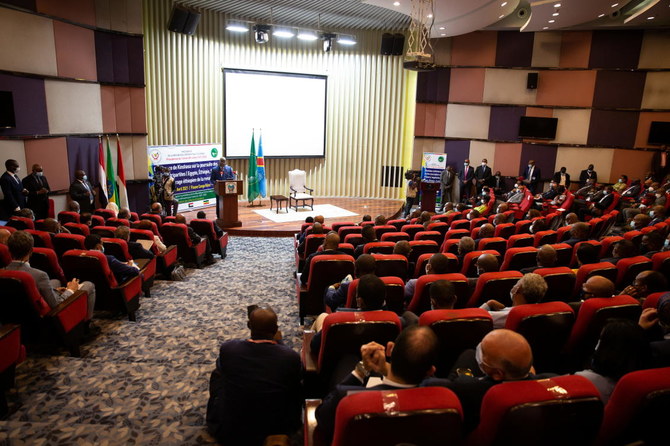CAIRO: Egypt announced on Tuesday that the latest round of talks with Ethiopia and Sudan over the Grand Ethiopian Renaissance Dam (GERD) in Kinshasa ended with no progress being made.
The negotiations were hosted by the Democratic Republic of Congo (DRC) on April 4-5, and no agreement has been reached on re-launching the talks.
Delegations from the three countries met hoping to break a deadlock in negotiations over a project Ethiopia says is key to its economic development and power generation.
Egypt fears the dam will imperil its supplies of Nile water, while Sudan is concerned about the dam’s safety and water flows through its own dams and water stations.
“Ethiopia rejected the proposal submitted by Sudan and supported by Egypt to form an international quartet led by the DRC, which heads the African Union, to mediate between the three countries,” Ahmed Hafez, spokesperson for Egypt’s Ministry of Foreign Affairs, said.
The Egyptian-Sudanese proposal aimed to resume negotiations under the leadership of Felix Tshisekedi, the DRC’s president, and with the participation of observers, in accordance with the existing negotiating mechanism, he added.
However, Ethiopia’s rejection led to the meeting’s failure to reach a consensus on the re-launch of negotiations.
Hafez’s statement said the Ethiopian rejection revealed “Ethiopia’s lack of political will to negotiate and its endeavor to procrastinate.”
Egypt’s Foreign Minister Sameh Shoukry expressed appreciation for Tshisekedi’s efforts and reaffirmed “Egypt’s willingness to assist and support him in his endeavors to find a solution in a manner that takes into account the interests of the three countries and enhances the stability of the region.”
This came after Egypt, Sudan and Ethiopia agreed to extend their talks for hours to make room for drafting a final statement after the intervention of Tshisekedi.
Shoukry said that the talks in Kinshasa were the “last chance” that must be seized “to achieve the interests of all parties involved.”
Shoukry added: “Egypt has been negotiating for over 10 years with sincere political will in order to reach an agreement that achieves Ethiopia’s development goals and preserves the rights and interests of the two downstream countries.”
Before the meeting, Sudanese Minister of Foreign Affairs Mariam Al-Sadiq said Ethiopia ignored clear warnings about the second unilateral filling of the dam.
She renewed her call for a new approach and the signing of a legally-binding agreement to avoid any new conflicts over the dam.
The meeting came a few days after Egyptian President Abdel Fattah El-Sisi warned that nobody would be able to “take a drop of water” from the country, and that there would be regional instability if its water rights were violated.
The US has repeatedly affirmed its support for the three countries and pushed any efforts to resolve the dispute.
In a phone call with Sudanese Prime Minister Abdallah Hamdok, US Secretary of State Antony Blinken discussed the Kinshasa talks and the need to reduce tensions over the issue.

























